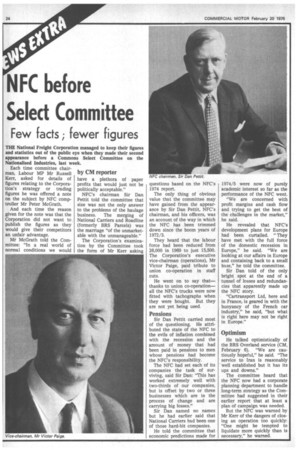NFC before Select Committee
Page 26

If you've noticed an error in this article please click here to report it so we can fix it.
Few facts; fewer figures THE National Freight Corporation managed to keep their figures and statistics out of the public eye when they made their second appearance before a Commons Select Committee on the Nationalised Industries, last week.
Each time committee chairman, Labour MP Mr Russell Kerr, asked for details of figures relating to the Corporation's strategy or trading figures he was offered a note on the subject by NFC comptroller Mr Peter McGrath.
And each time the reason given for the note was that the Corporation did not want to publish the figures as they would give their competitors an unfair advantage.
Mr McGrath told the Committee: "In a real world of normal conditions we would
by CM reporter
have a plethora of paper profits that would just not be politically acceptable."
NFC's chairman Sir Dan Pettit told the committee that size was not the only answer to the problems of the haulage business. The merging of National Carriers and Roadline (formerly BRS Parcels) was the marriage "of the unmarketable with the unmanageable."
The Corporation's examination by the Committee took the form of Mr Kerr asking questions based on the NFC's 1974 report.
The only thing of obvious value that the committee may have gained from the appearance by Sir Dan Pettit, NFC's chairman, and his officers, was an account of the way in which the NFC has been trimmed down since the boom years of 1972/3.
They heard that the labour force had been reduced from 26,000 in 1969 to just 15,500. The Corporation's executive vice-chairman (operations), Mr Victor Paige, paid tribute to union co-operation in staff cuts.
He went on to say that— thanks to union co-operation— all the NFC's trucks were now fitted with tachographs when they were bought. But they are not yet being used.
Pensions
Sir Dan Pettit carried most of the questioning. He attributed the state of the NFC to the evils of inflation combined with the recession and the amount of money that had been paid in pensions to men whose pensions had become the NFC's responsibility.
The NFC had set each of its companies the task of surviving, said Sir Dan: "This has worked extremely well with two-thirds of our companies, but is offset by two or three businesses which are in the process of change and are carrying big losses."
Sir Dan named no names but he had earlier said that National Carriers had been one of those hard-hit companies.
He told the committee that economic predictions made for 1974/5 were now of purely academic interest so far as the performance of the NFC went.
"We are concerned with profit margins and cash flow and trying to get the best of the challenges in the market," he said.
He revealed that NFC's development plans for Europe had been curtailed. "They have met with the full force of the domestic recession in Europe," he said. "We are looking at our affairs in Europe and containing back to a small base," he told the committee.
Sir Dan told of the only bright spot at the end of a tunnel of losses and redundancies that apparently made up the NFC story.
"Cartransport. Ltd, here and in France, is geared in with the buoyancy of the French car industry," he said, "but what is right here may not be right in Europe."
Optimism
He talked optimistically of the BRS Overland service (CM, February 6). "We are cautiously hopeful," he said. "The service to Iran is reasonably well established but it has its ups and downs."
The committee heard that the NFC now had a corporate planning department to handle long-term strategy as the Committee had suggested in their earlier report that at least a plan of campaign was needed.
But the NFC was warned by Mr Kerr of the dangers of closing an operation too quickly: "One might be tempted to liquidate more quickly than is necessary," he warned.
















































































































